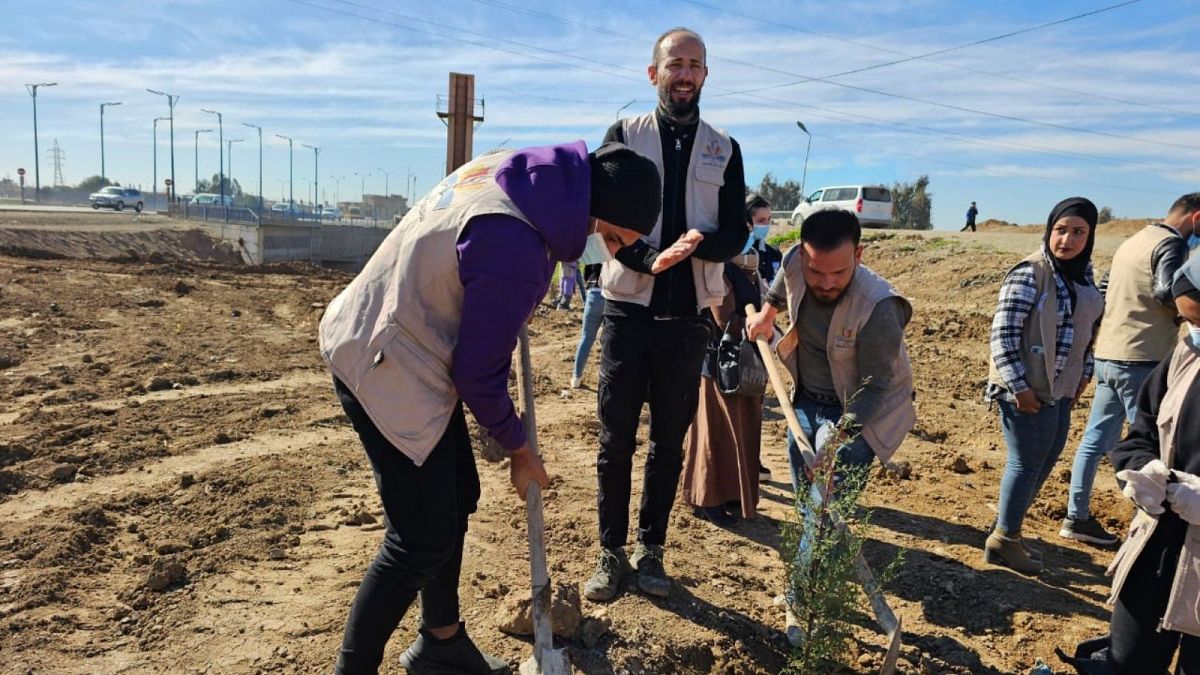‘Environmental healing’: Syrians plant trees near oil-polluted rivers
More than a decade of conflict has cost Syria at least 25 per cent of its forest coverage, while drought rages on.
Oil slicks in the Khabur River in Syria, a major tributary of the Euphrates, have left agriculture “almost impossible” according to one farmer in Hasakah.
For the past two months, Riyadh Al-Aswad has been desperately struggling to keep his wheat crop alive long enough for the harvest season. He is not alone in his plight as hundreds of other farmers across the northeast grapple with the pollution.
The oil spills, which first appeared in February, were blamed on Türkiye after its military conducted a series of airstrikes on Kurdish-affiliated oil refineries in northeastern Syria.
“Since the attacks, I stopped watering my lot using water from the river,” Al-Aswad tells Euronews Green. “It would be easier for me to just uproot the harvest and poison the soil instead.”
What’s behind the oil pollution in Syria?
According to the Turkish minister of defense, the attacks were in retaliation for the death of nine Turkish soldiers in January after Kurdish fighters linked to the Kurdistan Workers’ Party (PKK) raided a Turkish military base in Iraq.
The Syrian Democratic Forces (SDF), which Türkiye considers a branch of the PKK – a Turkish and Western-designated terrorist organisation – is the military wing of the Kurdish-led, US-supported Autonomous Administration of North and East Syria. AANES has gained control over much of Syria’s northeast following the conflict against Islamic State militant groups in Syria.
Türkiye has carried out a series of military ground operations since 2016 to limit SDF presence in border areas in northern Syria.
The continuous fighting has exacerbated an already deteriorating humanitarian crisis in the north, with five million people at risk of losing access to clean drinking water in a region once celebrated as the nation’s ‘breadbasket‘.
Northeast Syria is vulnerable to climate change
Al-Aswad now relies on rainfall for irrigation, but with Syria enduring its worst drought in seven decades, he is praying for an end to the precarious situation.
Oil pollution was not the only consequence farmers had to deal with in the aftermath of the attacks, according to Hamdan Al-Shammari, a farmer from Tell Brak.
“By disrupting oil flow to the region, the airstrikes have worsened the power cuts in the northeast, which can go on for most of the day,” he explains. “It also reduced the availability of diesel needed to power irrigation systems for generating water flow to the soil.”
Climate change is a global threat, and Syria’s northeast is no exception, especially as it suffers the decades-long consequences of desertification and drought. It is also in constant need of reforestation efforts, according to Raman Drouish, agricultural engineer and environmental expert.
More than a decade of conflict has cost Syria at least 25 per cent of its forest coverage, leaving it “at very high risk in terms of vulnerability and low readiness to adapt to climate change,” according to an EU climate change risk index.
Fareed Saadoun, a Kurdish affairs analyst, notes that primitive oil extraction and refining techniques have long plagued the region. “Burning crude oil has caused the production of derivatives filled with toxic and carcinogenic gases, which have had a negative impact on general health in northeast Syria,” he says.
“You have on one end, the scarcity of green areas; on the other, the lack of adequate attention to reforestation, and to make matters worse, the Turkish attacks on the region,” Drouish says.
“Against this backdrop, reforestation campaigns become more important than ever.”
Civil society unites for a greener northeast
In response to the airstrike and ongoing drought, a coalition of 31 civil society organisations in northeastern Syria have organised a voluntary campaign to plant an initial 1,000 trees in the first half of 2024.
The joint effort, called Aghras Al-Somoud (planting resilience in English) kicked off on 27 February. So far local organisations have planted 400 trees in Hasakah and 200 trees in Qamishli, almost 200 metres away from the location of the oil spills in the Khabour.
“This is our solution to save our homes from drought and to respond to the Turkish attacks that are plaguing us,” says Idris Dawood, chairman of the Administrative Committee of the Youth Civil Society Organization, which oversees coordination between the participating groups.
“These trees can be at least a first step towards environmental healing.”
The effort is not uncommon in northeast Syria and dovetails with several other projects to combat drought in the region.
In Gueran neighbourhood, an area grappling with deforestation and recurrent droughts, a community initiative planted 1,700 seedlings in February with the goal of ultimately improving air quality.
“Although the campaign was small-scaled covering only the neighbourhood, it was a joint communal effort that helped us feel that we’re helping our city,” says resident Jassem Al-Hamid.
Another successful initiative was launched in March by the residents of Al-Hilaliyah in Qamishli, where Kurds live alongside Syrian IDPs. Members of the community donated funds, each to the best of their ability, to plant more than 1,000 trees.
“The area that was planted near the Turkish border was a barren wasteland. It has now become a communal space, where families can gather and enjoy the fresh air,” says Akid Barhou, a resident of the neighbourhood.
Trees can play an important role in mitigating climate change, says Drourish, or “at least create a kind of adaptation to drought and desertification.”
“Such campaigns contribute to creating a kind of environmental balance, provided that they are sustainable, cover large areas, and are constantly cared for.”
This article is published in collaboration with Egab.




